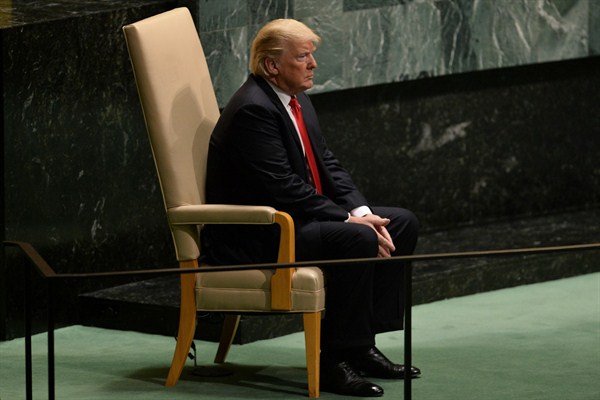When President Donald Trump takes to the United Nations podium Tuesday morning for his third annual address to the General Assembly, his audience may wonder why he bothered to come. By now, little mystery remains about his “America First” worldview. Foreigners are familiar with his commitment to nationalism, skepticism of treaties, affinity for strongmen, passion for walls, fear of immigrants, antipathy toward refugees, attachment to protectionism and denial of climate change. In sum, he rejects the very purposes and priorities of the United Nations. Those who still believe in multilateral cooperation are likely to endure Trump’s speech much as they would the offensive ramblings of an aging uncle over a holiday dinner. It will be a performance to suffer through, for at least one more year.
Trump’s first U.N. appearance in 2017 actually exceeded expectations—an admittedly low bar. The president’s salute to sovereignty, a term he invoked 21 times, resonated with developing countries sensitive to the principle of nonintervention. They welcomed the Westphalian thrust of Trump’s speech, as well as his observation that all U.N. member states should pursue their national interests. (They were less reassured by his promise to wipe North Korea off the map if it proceeded with its nuclear ambitions).
By the time Trump returned to the U.N. in September 2018, any goodwill had dissipated. In the intervening months, his administration had repudiated the international agreement curbing Iran’s nuclear program; defected from the U.N. Human Rights Council; suspended funding for Palestinian refugees; launched a trade war with China; hinted at leaving the World Trade Organization; rejected the U.N. Global Compact for Migration; and declared diplomatic war on the International Criminal Court. Trump’s speech got off to a bad start when, perhaps mistaking the setting for a Cabinet meeting, he bragged that he had accomplished more in under two years “than almost any administration in the history of our country.” The hall convulsed with laughter. The remainder of the address fared no better, reinforcing the impression that U.S. diplomacy was all take and no give.

